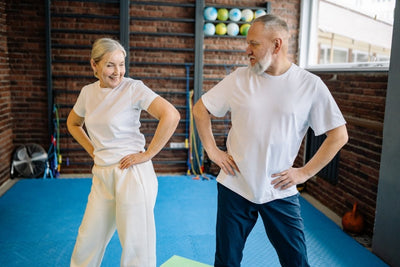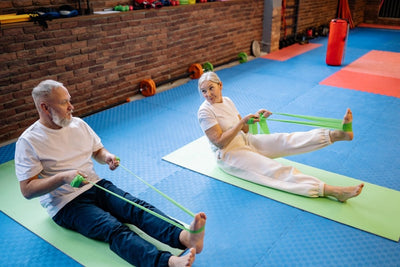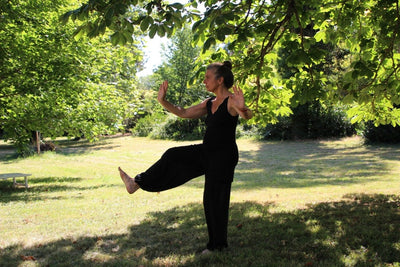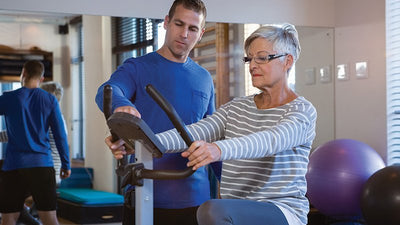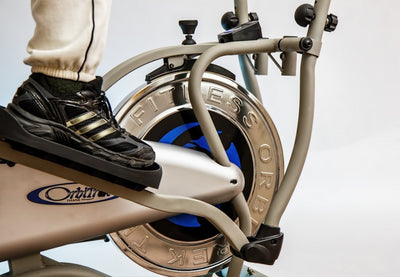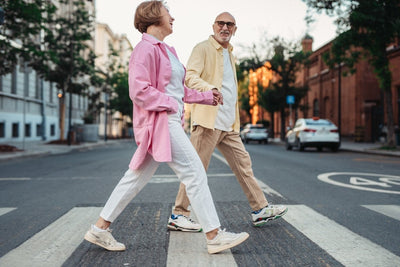BMI Weight Chart for Seniors Female ⚖️ Elderly Women (2023 Update)
The body mass index BMI, is a measurement of body fat based on height and weight that applies to both men and women between the ages of 18 and 65 years. BMI can be used to indicate if you are overweight, obese, underweight or normal weight. For adults, a BMI between 25 and 29.9 is considered overweight, while a BMI of 30 or above is considered obese. The elderly population is growing at a rapid pace worldwide. Consequently, the prevalence of obesity among older adults is also increasing.
BMI Weight Chart for Female Seniors & Elderly Women
The body mass index (BMI) is a measure of body fat based on height as well as weight that applies to both adult men and women. BMI does not measure body fat directly, but research has shown that BMI is moderately correlated with more direct measures of body fat, such as skinfold thickness measurements, bioelectrical impedance, underwater weighing, dual energy x-ray absorptiometry (DXA) and others. BMI can be used as a screening tool to identify possible weight loss problems for older adults. However, BMI is not a diagnostic tool. For example, a person may have a high BMI due to increased muscle mass or bone density. To determine if a high BMI is a health risk, health care providers look at other factors such as waist circumference, health issues & conditions and family history.
What is BMI?
BMI, or body mass index, is a calculation that uses height as well as weight to estimate how much body fat a person has. BMI does not measure body fat directly, but it is a useful tool to estimate whether a person is carrying too much weight for their height.
BMI is used differently for children and teens than it is for older adults. For children and teens, BMI is used as a screening tool to identify potential weight loss problems. It is not used to diagnose obesity because BMI varies with age and gender.
For adults 20 years and older, BMI falls into one of these categories:
Underweight = Below 18.5
Normal weight = 18.5-24.9
Overweight = 25-29.
How To Calculate BMI Range for Seniors & Elderly
The ideal weight for a senior or elderly woman is different than that of a younger woman. To calculate BMI range for seniors & elderly, the first step is to find out what their ideal weight should be.
There are many factors that go into calculating ideal body weight, including height, frame size, age, and activity level. Once you have determined all of these factors, you can use a BMI chart to find your BMI range.
For example, if you are a 5’4” woman who is aged 60-70 years old, your ideal weight would fall between 107-133 pounds. If you are sedentary, your BMI would fall in the lower end of this range (107 pounds), whereas if you are very active, your BMI would be at the higher end (133 pounds).
BMI Weight Chart for Female Seniors & Elderly Women
As women age, their bodies go through a number of changes. One of the most notable changes is an increase in body fat. This can lead to a number of health issues & problems, including obesity. The best way to combat obesity is to maintain a healthy weight loss. The best way to determine if you are at a healthy weight is to use a BMI chart.
A BMI chart is a tool that allows you to compare your weight and height to see if you are within a healthy range. If you are overweight or obese, it can help you lose weight by setting realistic goals. For example, if your goal is to lose 10 pounds, you can use the BMI calculator chart to see how long it will take you to reach your goal weight.
The BMI calculator chart for female seniors and elderly women can be found online or in magazines geared towards senior citizens.
Weight Chart for Senior Females |
||||
|---|---|---|---|---|
| Height (feet & inches) | Weight (lbs) | Height (centimetres) | ||
| Small Frame | Medium Frame | Large Frame | ||
| 4′ 10″ | 102-111 | 109-121 | 118-131 | 147cm |
| 4′ 11″ | 103-113 | 111-123 | 120-134 | 150 cm |
| 5′ | 104-115 | 113-126 | 122-137 | 152 cm |
| 5′ 1″ | 106-118 | 115-129 | 125-140 | 155 cm |
| 5′ 2″ | 108-121 | 118-132 | 128-143 | 157 cm |
| 5′ 3″ | 111-124 | 121-135 | 131-147 | 160 cm |
| 5′ 4″ | 114-127 | 124-138 | 134-151 | 162 cm |
| 5′ 5″ | 117-130 | 127-141 | 137-155 | 165 cm |
| 5′ 6″ | 120-133 | 130-144 | 140-159 | 167 cm |
| 5′ 7″ | 123-136 | 133-147 | 143-163 | 170 cm |
| 5′ 8″ | 126-139 | 136-150 | 146-167 | 172 cm |
| 5′ 9″ | 129-142 | 139-153 | 149-170 | 175 cm |
| 5′ 10″ | 132-145 | 142-156 | 152-173 | 178 cm |
| 5′ 11″ | 135-148 | 145-159 | 155-176 | 180 cm |
| 6′ 0″ | 138-151 | 148-162 | 158-179 | 183 cm |
What is a normal BMI for 60 year old woman?
The average weight and BMI for a female senior citizen that is 60 years old is around 145 pounds, although this can be different based on a range of factors.
Normal Weight Range for Female Seniors & Elderly Women
Numbers can differ based on factors such as height, age, and health status. A healthy weight range for a woman of this age group is typically between 110 and 170 pounds. Many elderly women may find it difficult to maintain their weight due to health conditions that can cause muscle loss or a decrease in appetite. However, it is important for seniors to try to stay within a healthy weight range to reduce the risk of developing obesity-related health problems such as heart disease, stroke, and type 2 diabetes.
Overweight Range for Female Seniors & Elderly Women
The average weight for a female senior citizen is about 143 pounds. An overweight senior citizen is any woman who weighs more than 143 pounds. Elderly women are more likely to be overweight than younger women. This is because they often have less muscle mass and more body fat. Being overweight can lead to health problems such as heart disease, stroke, and diabetes. It is important for elderly women to maintain a healthy weight by eating a balanced diet and exercising regularly.
Obesity Range for Female Seniors & Elderly Women
The prevalence of obesity is increasing in the United States. In 2015-2016, 40.8% of older adults aged 60 and over were obese. This percentage has been slowly but steadily increasing since 1999-2000 (when it was 30.5%).
Obesity rates are highest among middle-aged older adults (45-54 years old) and those aged 85 and over. However, the rates among seniors aged 60-64 and 75-84 have also increased significantly over time.
Female seniors are more likely to be obese than their male counterparts. In 2015-2016, 43.3% of women aged 60 and over were obese, compared to 38.1% of men in this age group.
Obesity can lead to a number of serious health problems, including heart disease, stroke, diabetes, and certain types of cancer.
Does BMI increase as you get older?
As people age, they often gain weight. This extra weight can lead to an increase in body mass index (BMI). BMI is a measure of body fat based on height as well as weight. A BMI of 25 or higher is considered overweight, while a BMI of 30 or higher is considered obese.
Many factors can contribute to weight gain as we age. These include changes in metabolism, hormone levels, activity levels, and diet. For example, older adults tend to have a slower metabolism than younger adults. This means they burn calories at a slower rate, which can lead to weight gain. Hormone changes can also affect weight. For example, women may gain weight during menopause due to declining estrogen levels.
Inactivity can also contribute to weight gain as we age. Older adults are often less active than younger adults due to retirement, illness, or injury.
Is a low BMI dangerous for seniors & elderly men and women?
While a low BMI might not be as dangerous for seniors and elderly men and women as it is for younger people, it can still pose some health risks. A low BMI can lead to malnutrition, which can weaken the immune system and make seniors more susceptible to illness. Additionally, a low BMI can cause muscle loss and bone density problems.
That said, seniors and elderly men and women should talk to their doctor if they are concerned about their weight. There are many factors that can affect weight, including medications, health conditions, and lifestyle choices. Seniors should work with their doctor to develop a plan that is right for them.
How To Safely Maintain & Reduce BMI in Seniors
As we age, our metabolism slows down and we lose muscle. This can make it difficult to maintain a healthy weight. But it’s important to stay at a healthy weight, because being overweight or obese increases your risk of developing chronic diseases such as heart disease, stroke, and diabetes.
There are several things you can do to safely maintain a healthy body weight as you age. First, eat a healthy diet that includes plenty of fruits, vegetables, and whole grains. Avoid processed foods and sugary drinks. And make sure to get enough protein—aim for about 0.36 grams per pound of weight per day.
Second, stay active. Regular physical activity helps to boost your metabolism and build muscle. Aim for at least 30 minutes of moderate-intensity exercise most days of the week.
FAQ's
What is a normal BMI for 60 year old woman?
A woman's BMI changes throughout her life. In general, a 60-year-old woman should aim for a BMI of 25 to 30. This is because as we age, our bodies change and our metabolism slows down. So, a healthy weight for a 60-year-old woman would be in the range of 115 to 154 pounds. Of course, this is just a general guide and each individual's ideal weight will vary depending on their height, frame size, and muscle.
What is the ideal BMI for senior women?
Many experts believe that the ideal body mass index (BMI) for senior women is between 25 and 30. This range is considered to be a healthy weight for most women over the age of 65. However, it is important to keep in mind that BMI is only one factor to consider when it comes to overall health. Other factors, such as muscle and bone density, can also affect a woman’s ideal weight.
It is also important to remember that weight alone does not always indicate whether someone is healthy or not. A woman who has a BMI within the “healthy” range may still be at risk for health problems if she does not exercise regularly or eat a nutritious diet. Conversely, a woman with a higher BMI may be perfectly healthy if she takes good care of her body.
What is the ideal height and weight for an older female at age 65?
The ideal weight and height for an older female varies depending on a number of factors. However, a general rule of thumb is that an older woman should weigh 10-15% less than she did in her younger years, and be 2-3 inches shorter. This range will allow her to maintain her health and avoid obesity-related diseases.
While there are a number of different charts and formulas that can be used to calculate the ideal weight and height for an older woman, it is ultimately up to the individual to determine what is best for her own body. Every woman is different, and what works for one may not work for another. It is important to consult with a doctor or nutritionist to find out what range is best for you.
Is it possible to lose weight at age 70?
It is possible to lose weight at age 70. In fact, many seniors are able to lose weight and keep it off with a little bit of effort. The key to success is finding the right diet and exercise plan that works for you.
There are a few things to keep in mind when trying to lose weight as a senior. First, it’s important to consult with your doctor before starting any new diet or exercise regimen. This is especially important if you have any health conditions that could make weight loss more difficult.
Second, don’t be discouraged if you don’t see results right away. It often takes longer for seniors to lose weight than younger people, so be patient and stick with it.
Finally, remember that even small changes can make a big difference.
Conclusion
When it comes to maintaining a healthy weight, every little bit counts. And that's especially true for older women. A woman's metabolism slows down as she ages, meaning she has to work a little harder to keep the pounds off.
That's why it's important for older women to be mindful of their diets and exercise regimens. Eating healthy foods and getting regular exercise will help keep your weight in check and your body feeling its best.
So don't wait until you're carrying around extra weight to start making changes. If you're already at a healthy weight, great! Keep up the good work. But if you're carrying around a few extra pounds, now is the time to make some changes. Adopting a healthier lifestyle will help you feel better now and stay strong and independent as you age.
Related Articles
Read more Exercise & Fitness for Seniors articles.


